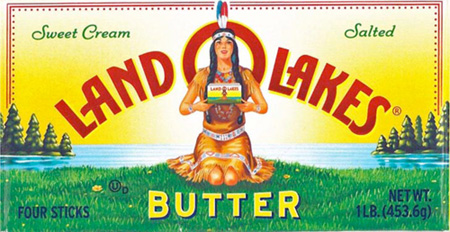Images of Native Americans in Advertising
ADText: Advertising Curriculum
Images of Native Americans in Advertising

1. Introduction
Throughout its history, American advertising has used language and imagery depicting various ethnic and racial groups. A great many of these representations of non-White people would today be labeled as racist and stereotypical. Although contemporary advertising generally strives to be sensitive to multicultural issues, there remain many places in advertising and marketing where greater efforts are possible.
This unit focuses specifically on Native American (including Alaskan and Hawaiian) ethnic imagery in advertising. It examines both older representations and some more contemporary ones. It seeks not only to survey the story of Native Americans and advertising but also to serve as a model for similar investigations of the relationship between other ethnic/racial groups and advertising.
2. Cigar Store Indians
The cigar store Indian is one of the earliest uses of Native American imagery in advertising and marketing. This symbol parallels the use of other identifying symbols for different types of commercial concerns, such as three gold balls for pawnshops and candy-striped poles for barbershops. Historically, such symbols came into use in medieval Europe when the population was largely illiterate and merchants needed an easy way to indicate the types of goods or services they offered.
In Europe, the earliest examples of cigar store Indians did not attempt to depict the physiognomy or lifestyles of actual Native Americans because carvers in the 1500s had seen none nor had photography been invented. Rather, this early imagery depicted either white Europeans or black Africans in Native American headdresses and costumes (such as kilts made of leaves or feathers). These early figures morphed over time into more complex and detailed representations of Native American cultures and peoples.






